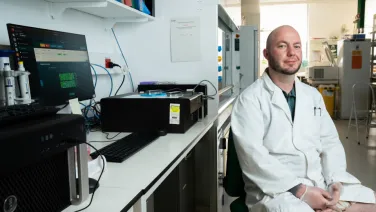
Schwessinger Group - Plants, fungi, evolution
Our team focuses on questions around plant biosecurity in Australia by studying the interaction between plants and their fungal pathogen.
About
Our team focuses on questions around plant biosecurity in Australia by studying the interaction between plants and their fungal pathogen. Specifically, we work on agronomic important wheat rust fungi and the environmental important myrtle rust fungus that infects a wide range of myrtacea (e.g. eucalyptus trees).
Key questions are:
- How do these invasive fungal pathogens infect host plants?
- What are the genes underlying host adaptation enabling infection?
- How does evolution and adaptation shape genome structure in agricultural vs. natural ecosystems?
- Can we develop cutting edge sequence based methods for pathogen detection?
- How do microbial communities in plant leaves change during the infection with invasive pathogens?
Many of these questions are also applicable to other study systems, hence we are a really collaborative team. We work with other groups at RSB and beyond on plant, animal, and fungal genomics.
The science in the 'lab':
We are a highly collaborative and interactive team that studies the interaction of fungi and plants, as main focus. We use a wide varity of tools reaching from biochemistry, bioinformatics, genomics, to environmental sampling. Modern biology is best mixed by combining good 'old school' biochemistry with modern data science stired with interesting biological questions.
Plants and fungi are simply awesome.
We study these plant-fungi interactions on multiple molecular and temporal scales. This includes many aspects:
- Detailed molecular interaction studies of plant and fungal proteins leading to disease or immunity. The seconds to days timescale.
- Detailed genome evolution and adaptation of fungal pathogens, especially the wheat stripe rust and myrtle rust fungus, in response to wild and agricultural ecosystems. The months to years timescale.
- Detailed comparative and population genomics analysis of rust fungi with a focus on wheat rusts. The decades to millions of year timescale.
Projects in the 'lab' in 2024 onward:
- Fungal genomics, evolution, and host adaptation (Summer, Honours, Master, and PhD students)
- Detection of fungal pathogens and their associated microbiome (Summer, Honours, and Master students)
- A synthetic biology approach to detect pathogen molecules in crops (Summer, Honours, Master students, and PhD students)
- Genomics of wild Australian brewing yeasts (Honours and Master students)
We aim to publish work performed by students on its own or as part of a bigger manuscript. Everyone will be clearly rewarded with appropriate authorship.
The science beyond the 'lab':
Beyond being nerds, we aim to contribute to a welcoming and progressive academic environment. Group members are actively encouraged to contribute to community events, outreach science communication, and university commities. For example, group members were part of eLife's Early Career Advisory Board, ambassador for the protocol sharing webpage protocols.io, members of the RSB Equity Committee and others. And of course we love open access and reproducible science.
Awards
- Alan Wilton Award, 2025
- Postgraduate Medal for Academic Excellence, 2024
- ASPS Education and Outreach Award, 2024
- ACT Emerging Scientist of the Year Award, 2022
- ANU Chancellor's International Scholarship (Postgraduate International Applicants), 2021
- Ignition Grant, 2019
- ARC Discovery Early Career Researcher Award (DECRA), 2015
- Long-Term Fellowship (EMBO), 2012
- HFSP Long-Term Fellowship , 2012
- John Innes Foundation Prize for Excellence in Scientific Research, 2011
- Plant Science Scholarship, 2006
- Short-listed for the SET Student of the Year Awards, 2006
- Lang Scholarship (Botany), 2005
Publications
Please refer to Google Scholar, Pubmed, or ANU Researcher Portal for our latest publications.









